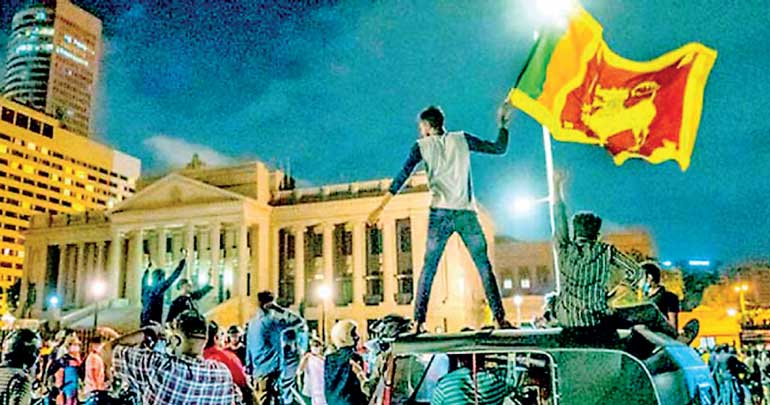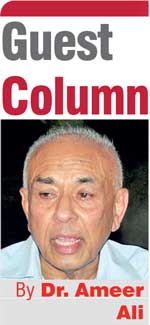Thursday Feb 12, 2026
Thursday Feb 12, 2026
Saturday, 29 June 2024 00:10 - - {{hitsCtrl.values.hits}}
 The time has come to handover the baton to the new generation and not be foolish to underestimate its talent and commitment to remake Sri Lanka into an economically sustainable democracy with rule of law
The time has come to handover the baton to the new generation and not be foolish to underestimate its talent and commitment to remake Sri Lanka into an economically sustainable democracy with rule of law
They are not only underestimating the intelligence of the new generation of voters who could distinguish between the objectives, programs and methodology of JVP in the past and its new NPP avatar, but also are hiding the fact that the mayhem was caused more by the reactionary forces ruling the country at that time than JVP itself. Beyond this elementary truth the critics also do not want to concede that the mother of all crises in Sri Lanka is the socio-political system built on an ideology of Sinhala Buddhist chauvinism (SBC) born out of political Buddhism
 Thanks to the Aragalaya youth, their demand for system change has grown beyond its sloganeering stage and has become the single most important yet a controversial issue dominating political dialogue in this country. Although that dialogue is current within the erudite and politically awakened circles, it could spread widely across the nation as the election approaches and may even enter the political vocabulary of ordinary voters in its vernacular equivalent. The credit for this development should go to NPP, the child of Aragalaya, for its firm commitment and resourceful campaign to make this change a historic reality.
Thanks to the Aragalaya youth, their demand for system change has grown beyond its sloganeering stage and has become the single most important yet a controversial issue dominating political dialogue in this country. Although that dialogue is current within the erudite and politically awakened circles, it could spread widely across the nation as the election approaches and may even enter the political vocabulary of ordinary voters in its vernacular equivalent. The credit for this development should go to NPP, the child of Aragalaya, for its firm commitment and resourceful campaign to make this change a historic reality.
However, and as expected, the critics of system change who stand to benefit from retaining the status quo are directing their criticism not on the shape and content of NPP’s alternative but on JVP the leading component of NPP coalition and its leader Anura Kumara Dissanayake (AKD). These critics are engaged in a scare campaign to remind voters of JVP’s insurrectionary past and the mayhem resulted.
In doing so they are not only underestimating the intelligence of the new generation of voters who could distinguish between the objectives, programs and methodology of JVP in the past and its new NPP avatar, but also are hiding the fact that the mayhem was caused more by the reactionary forces ruling the country at that time than JVP itself. Beyond this elementary truth the critics also do not want to concede that the mother of all crises in Sri Lanka is the socio-political system built on an ideology of Sinhala Buddhist chauvinism (SBC) born out of political Buddhism.
Before proceeding further, one crucial point needs stressing to clear misunderstanding. It is not Buddhism that is in the dock but political Buddhism a local variant with political motives claiming to redress the injustice done to that faith under more than four centuries of Christian dominance. There is no question that Buddhism, which is not a religion in the Western sense, is a blessing to this paradise island and it is destined to remain the most dominant way of life and practice for the vast majority of Sri Lankans for centuries to come. In that sense, it is indestructible. But political Buddhism is narrow in its focus and is mainly concerned with converting the nation into a Sinhala Buddhist majoritarian fortress.
To the idealogues of this political offshoot the pluralist polity of the island with ethnic and cultural diversity is a historical accident that needs to be corrected. In trying to make that correction through democracy and party politics that ideology not only became the primary source of ethnic disharmony and national discontent since 1950s, but also a license to un-Buddhist ideals, behaviour and practices in the course of its existence.
It was SWRD who profited most from political Buddhism and paid a heavy price for doing so. Even the American CIA learnt from him how to manipulate Buddhism politically and profitably to chase out the Communist enemy from South East Asia. However, every Government that came to power in Sri Lanka since then used Buddhism as cover to hide all their failings and the art of governance descended into a game of fortune hunting for many unscrupulous leaders in the name of protecting and promoting Buddhism. Corruption and crime, violence and chicanery, gerrymandering and judicial manipulation, maladministration and mismanagement were all tolerated in the name of protecting Sinhala Buddhist supremacy. In short, the noble teachings of the Buddha were shamelessly sacrificed and bargained for earthly benefits. As a result, the Sangha’s once virtuous image was seriously damaged.
Moreover, the House of Parliament began to lose its aura and discipline and descended into an assembly of semi-educated and morally depraved fortune hunters with little respect for the discipline and decorum of that august body, the economy was driven to bankruptcy, pubic assets were plundered, communal harmony destroyed, human rights stampeded, judiciary lost its independence and the country as a whole descended into a state of chaos caught in a poly-crisis. Shouldn’t the system that was responsible for this carnage be removed and its upholders and managers replaced with another system which would be secularly democratic, economically just, and morally virtuous under a new generation of leaders? That is the challenge and choice voters will be confronting at the next election. In that sense, it is going to be a choice between NPP and any one or more from the rest.
In advocating system change, NPP is also confronted with the question of positioning Buddhism in the new system. While the art of governance and administration remain secular business there is no question of devaluing Buddhism or any religion for that matter from the primacy they hold among their respective practitioners. The new system has to respect that primacy, and the new leaders of whatever faith they belong to have to respect and accommodate the values of virtuosity emanating from those quarters. But there must be a line drawn by the constitution between the sphere of influence of the temporal authority and centres of the sacred. That separation does not mean demotion of the sacred. Whether one likes it or not Sri Lanka is and will remain a Buddhist country with or without Government support.
But, the primary focus of the new system should not be the spiritual advancement of any community but the material upliftment of all communities. That cannot be done if communities are treated discriminatingly in the production and distribution of the national product. The political culture that developed on the back of political Buddhism produced a class of exploiters and parasites that went to bed with whatever government in power to enhance their private accumulation at the expense of public wellbeing. This class was not confined to any particular community but grew among all communities. As a result, more than 75 years of a distorted and corrupt democracy in the name of Buddhism only ended in widening the wealth gap between the minority have lots and majority have nots.
The middle class has virtually disappeared from the scene. And each time when the economy was in crisis IMF was called upon to assist. It assisted 16 times earlier and assisting now for the 17th. IMF is not a charitable organisation but an institution established specifically to serve the interests of the rich and moneyed. Which country in the world that invited IMF for help ever succeeded in achieving robust growth with a political system ridden with nepotism and corruption?
That is why NPP wants to introduce a new system as demanded by a new generation of Sri Lankans. Incidentally, today’s systemic crisis is not confined to Sri Lanka only. It is a universal phenomenon expressed in a variety of forms by the new generation. Accordingly, NPP wants to get rid of the current corrupt political culture through a social revolution, and replace it with a democratic society where economic and humanitarian justice would prevail. The economic shape and content of this new society would demand longer discussion which would be the subject for another occasion. For the moment, let me pick up just one but dominant fear spread by NPP’s critics.
The critics, in the course of praising the achievements of RW, are warning voters that IMF would pack up and run away if NPP were to come to power. This is a baseless argument which only exhibits the intellectual limitations of the scaremongers. NPP has always maintained that it would be working with IMF but on a renegotiated agenda focused on strengthening the productive capacity of local real sector. Unless the local economy produces an exportable surplus how on earth could Sri Lanka be freed from debt? The entire economic agenda of the new system should be centred in achieving that primary objective.
Without economic independence political independence has no meaning. But in the name of achieving economic independence no government should mortgage the country’s political independence to foreign capital or foreign powers. What happened since 2023 under RW with IMF tutelage was just that. NPP’s new system should therefore chart a new direction to achieve economic independence without surrendering political independence. It is not impossible and could be achieved with support of the people. But to win that support the system must provide economic justice with democratic freedom and rule of law. It is only under such a system that minorities could live with dignity and without fear of institutionalised discrimination. A new constitution should be structured on that foundation.
The dying generation is a failed generation responsible for all the calamities the nation faced since independence. If there were some positive developments they were achieved at heavy social cost. The past is full of errors and it is a pointless past time to enumerate and philosophise about them. The time has come to handover the baton to the new generation and not be foolish to underestimate its talent and commitment to remake Sri Lanka into an economically sustainable democracy with rule of law and without destroying the country’s cultural diversity like modern Singapore. They deserve a chance.
(The writer is attached to the Business School, Murdoch University, W. Australia.)